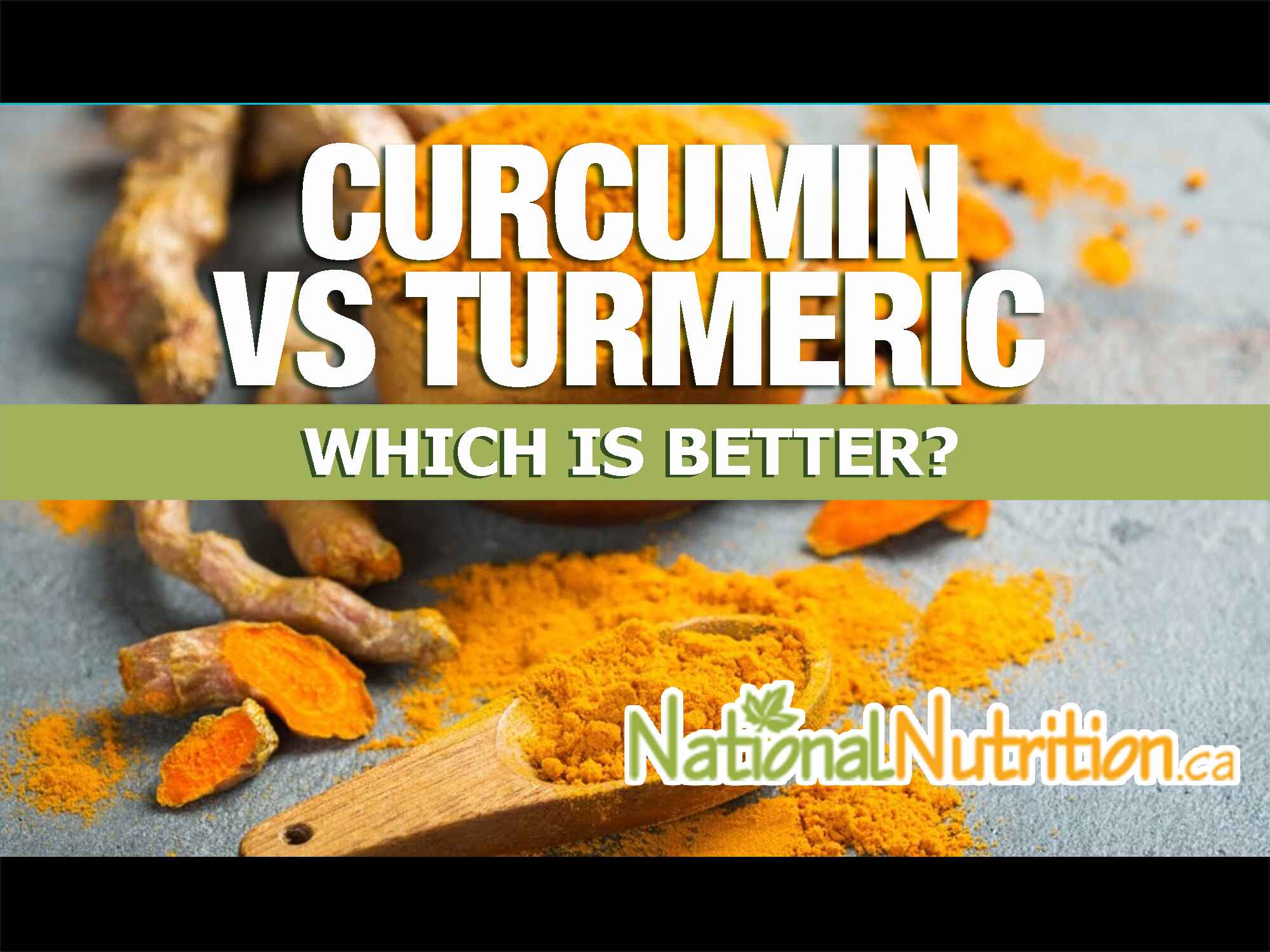
Curcumin vs Turmeric
Updated Jul. 10th, 2023 | Read Time: 5 Minutes | What You Will Learn:
- Turmeric vs Curcumin
- Turmeric & Curcumin FAQs
When it comes to the world of supplements (and the plant world, too! ), the names of ingredients can sound similar but mean different things. Case in point: curcumin vs turmeric. These are two words you may see together.
Here's the breakdown of curcumin vs turmeric: turmeric comes from the curcuma Longa plant which is part of the ginger family. Turmeric has been used in Ayurvedic medicine for thousands of years because of it’s active ingredient, curcumin, which possesses medicinal properties.
While the two names are often used interchangeably, there are key differences between curcumin vs turmeric that you should know.
Turmeric vs Curcumin
As mentioned, turmeric is the root of the plant, vs curcumin is its active ingredient that possesses antioxidant and anti-inflammatory properties which have promising health benefits according to research.
Turmeric, also known as "Indian saffron," has been used for centuries in cooking because of its bright yellow colour and taste. Turmeric is often added to dishes like curry or condiments like mustard; in fact, did you know turmeric is added to yellow mustard to enhance its colour? It's also been used as a textile dye and in topical medicine.
Here are some interesting facts about curcumin:
- Curcuminoids are part of a group of compounds found in turmeric called "polyphenols."
- Turmeric contains between 2 and 9% curcuminoids.
- Curcumin is the most abundant curcuminoid in turmeric and provides about 75% of the total curcuminoids.
- Curry powders contain turmeric and other spices vs having a high curcumin concentration.
- Most studies showing the benefit of turmeric or curcumin have used curcumin.
Curcumin vs Turmeric Supplements
Research has shown curcumin to be beneficial for the following concerns:
- Inflammation
- Joint health and painful joints
- Liver health
- Brain health, including neuroprotection and mood benefits
- Heart health
- Type II diabetes
- Premenstrual syndrome
Curcumin is probably for you if you want to support a specific condition. Here is what to look for when buying a curcumin supplement:
Look for curcumin supplements that is enhanced with black pepper to increase absorption and organic when possible. You can often find this supplement in liquid or capsule form, this will depend on your personal preference; although liposomal supplements are often better absorbed. Depending on your health concern, you will want to look for a supplement that has a 500-1000mg potency. Lastly, since curcumin is fat-soluble, you want to ensure you’re taking your supplement with a fatty meal.
- Cautions: Curcumin is a safe and effective supplement for many people, but it's not recommended for everyone. It should not be taken if you have gallstones or bile duct obstructions. Curcumin may also not be appropriate if you are pregnant or breastfeeding. It is advisable to avoid curcumin if you are taking blood thinners or heart medications.
Using Turmeric
While curcumin has been researched for its health benefits, turmeric still has its benefits and place. Yes, curcumin is held to a higher standard vs turmeric supplements, and while turmeric can be purchased in supplement form, it can also be used to add flavour and antioxidants to many culinary dishes.
However, the problem with turmeric is that the body does not absorb it easily. Some evidence suggests that much of the ingested turmeric passes through the body without being absorbed.
All's not lost, though. Turmeric absorption can be increased by pairing it with black pepper, coconut oil, or ginger root. Here’s why:
- Turmeric is a fat-soluble nutrient; therefore it needs to be consumed with a fat source like coconut oil for your body to absorb it.
- Black pepper contains a property called piperine which has been shown to increase curcumin’s bioavailability by 2,000%.
- Ginger is a carminative herb that can help the body absorb other nutrients.
Cook With Turmeric
If using turmeric spice is more your speed, here are simple recipes you can follow:
- Add 1 teaspoon of ground turmeric powder when making soup.
- Add 1/2 tsp ground cumin seeds and 1/4 tsp ground cinnamon powder to your turmeric for an exotic taste that works well in curries.
- Heat turmeric powder, grated ginger, a sprinkle of black pepper, and a swirl of honey or maple syrup in a cup of almond milk to make a warming golden milk.
- Add a sprinkle of turmeric any time you use curry powder.
- Try making your own mustard by combining the mustard powder with apple cider vinegar, along with turmeric, sea salt, and black pepper.
Whether you decide to use curcumin vs turmeric (or both) will depend on a few factors, including your health goals. Generally speaking, curcumin is best for specific health goals, including reducing inflammation, easing joint pain, supporting brain health, and maintaining liver health. Curcumin supplements isolate this active compound, which has been studied and proven to be of benefit.
Turmeric, on the other hand, is not as well absorbed but does contain a spectrum of other beneficial polyphenols. Turmeric is a great spice to have on hand! It can add an interesting flavour and health benefits to the dishes you make in your kitchen, provided you use the techniques we mentioned to make it better absorbed.
Turmeric & Curcumin FAQs
Where can I buy curcumin?
Curcumin can be found in supplement form in health food stores and online, like at National Nutrition.
Where can I buy turmeric?
You can buy turmeric in most grocery stores and health food stores. It’s often sold in powder form, but some stores sell turmeric root in capsule formulas.
What is the difference between curcumin vs cumin?
Cumin and curcumin are two different things. Cumin is a spice that’s used in many countries around the world, including India and Mexico. It has a smoky flavour. Conversely, curcumin is extracted from turmeric root and is often sold as a supplement.
References
https://pubmed.ncbi.nlm.nih.gov/15202598/






















It is so cool to know that curcumin can be found in turmeric and is the one that is isolated to have those healthy health benefits. Trumeric is not well absorbed which makes sense why it is always recommended to take with black pepper. I never thought about taking curcumin alone as an isolated form from turmeric but it makes sense! Turmeric is a great spice to add to cooking and I love the flavour. I will be sure to remember black pepper!
Hello O,
It's fascinating how curcumin, the active compound in turmeric, has been found to have numerous health benefits. And you're right, taking it with black pepper can enhance its absorption in the body. Turmeric not only adds a delicious flavour to dishes but also offers potential health perks. So it's a win-win situation! Remembering to pair it with black pepper can maximize its benefits. Happy cooking and be sure to check out this healthy recipe which incorporates turmeric: https://www.nationalnutrition.ca/articles/healthy-recipes/slow-cooker-rutabaga-chicken-stew/
I've known this for a long time but it is an easy mistake to make and I've definitely seen people confusing or mixing up the two. I've heard the mnemonic, "Tumeric is the Total, curcumin is the component" before. Thank you for putting this article out there in order to clear up the confusion and to, as always, educate in an approachable and engaging manner. Also, I like how at the end you clear up a final possible misconception-that curcumin is not cumin!!! I bet that is a common source of confusion also
Hello Rachel,
Thank you for your appreciation and recognition of our efforts to provide clear and informative content. We understand that certain topics can be confusing, and it is our goal to educate in a manner that is approachable and engaging. We are glad that the article helped clarify the difference between turmeric and curcumin, this is an important distinction when shopping for supplements for therapeutic benefits. You can learn more about joint health, one of many concerns curcumin helps with, in this article: https://www.nationalnutrition.ca/articles/health-concerns/joint-health/